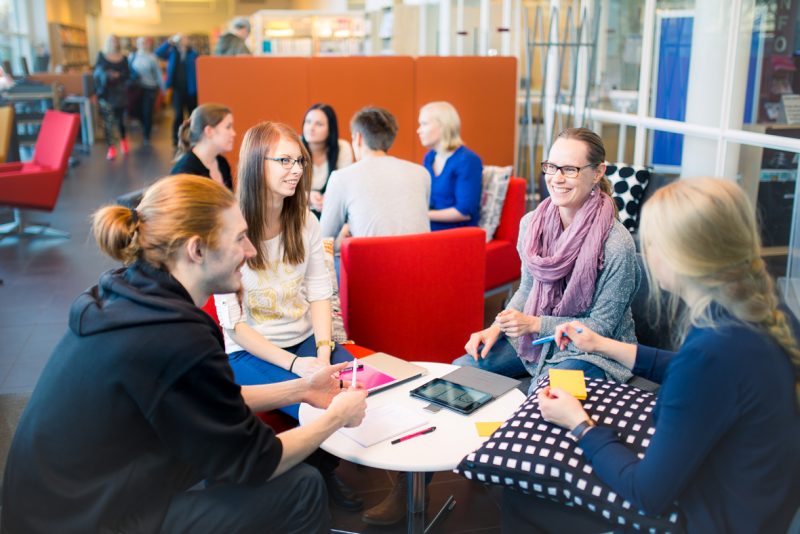Lifelong Learning Pathways for SMEs

“The only sustainable competitive advantage is an organization’s ability to learn faster than the competition.”-Peter Senge
Vidzeme Planning region from Latvia in co-operation with JAMK University of Applied Sciences organized a seminar on lifelong learning for smart specialization in the EU Strategy for Baltic Sea Region Annual Forum 2019 in Gdansk. Our focus was on the need of the Small and Medium Sized Enterprises (SMEs) to build their ability to learn and change in the transforming markets. Many sectors have not yet embraced the potential of bioeconomy and circular economy, nor the fast-moving digital world, even though their clients may already be there. The pressure for change is rising with diversification of customer needs and with entry of new competition from global and unexpected origins. Capacity to learn is vital for renewal of business models and uptake of innovations in SMEs to pave the way to sustainable and inclusive economic development.
In the seminar, we addressed the growing need to focus on lifelong learning as an instrument for the development of society and regions as well as the need to target SMEs as they account for 99 per cent of all companies in Europe. Greater attention should be paid to the learning process in the work environment and the lifelong learning should be included in the development strategy of each SME. The learning paths should be flexible, short-term and oriented to the needs of SMEs, and useful for the economic development of the regions. In the seminar, JAMK University of Applied Sciences introduced some of the existing best practices on how digitalization can enable targeted and flexible learning paths connected with the regional smart specialization areas.
Flexible learning paths for customer needs via digitalization
In the Institute of Bioeconomy, we strive support the agricultural SMEs and entrepreneurs struggling with the need to change. The transformation of the agricultural sector in Finland has been fast. The operational environment is in turmoil with the rise of new technologies, uncertainty caused by climate change and the changing policy environment. The connected global markets increase competition. Overall, the number of farms is decreasing. The remaining farms have to find competitiveness from scaling-up their operations, developing new business models, branding special products for niche consumer markets, engaging in co-operation with other farms and business as well as taking full advantage of the possibilities of digitalization, robotisation, automatisation and other new technologies.
The need to learn is continuous in a life of an entrepreneur or SME in the constantly developing operational environment. However, as is apparent from the dialogue with our SME networks, the entrepreneurs and SMEs of the agricultural sector struggle to find time to attend courses, seminar or workshops. They simply cannot leave the farm in the peak season, even though, this is the season when the challenges and development needs arise.
Therefore, Institute of Bioeconomy is bringing the learning to the rural entrepreneurs via digital solutions. The information sharing and development projects utilize, for example, video sharing social media platforms for peer learning and expert consultation as well as virtual tours of farms for studying best practices and solving arising challenges. Learning is conducted in co-operation between the peer network and expert advisors and professionals.
Of course, the Institute of Bioeconomy still provides typical open studies with credits and curricula as well as organizes workshops for sharing the lessons learned between the developers and SMEs. However, with digitalization, the Institute can provide expertise from more professions and competence areas catering tailored education to the specific needs of the SMEs and entrepreneurs in the time of need, at their own farm or facilities. Whether it is listening to an expert podcast in the hut of your tractor, or getting a video message from a veterinarian in response to your question on animal husbandry policies, in order to be continuous and truly life long, the learning needs to be flexible and integrated into the daily operations.
International network will pilot an open platform for learning and innovation
As the speed of change is ever faster, the true measure of ability to learn will be the ability to network and co-operate. At the Biobord platform, developed in RDI2CluB project, we can connect our peer learning groups and open learning services to enable wider team-building, partner finding and access to expertise and innovation support. Biobord can enable and support the development of regional and international learning platforms where people come together to solve joint challenges, learn from each other’s best practices and find partners in developing their business. The international connections as well as the higher connectivity between SMEs of the region enables joint challenges to become joint learning activities and finally new business opportunities.
Learning is a key enabler of not only change, but also innovation. Biobord will encourage learning on application of new technologies and business models, such as the valorisation of agricultural side streams, thus circular economy. Thereafter, Biobord will support idea generation, sharing and assessment as well as provide support for testing, experimentation and proof-of concepts to develop the ideas into commercial products and services. It will also support learning and sharing of solutions that will enhance the productivity, competitiveness and sustainability of the operations. Our piloting phase is starting in September 2019 and lasting until August 2020. Still, we are already committed to maintain the platform at least till 2025.
New initiatives are emerging in the Biobord network
As a part of the Biobord network activities, Vidzeme Planning Region and JAMK University of Applied Sciences are striving to build co-operation under the theme of lifelong learning for SMEs. The preparations have been supported by a EUSBSR flagship project for education led by Vidzeme Planning Region ‘BSR Smart Life’.
More information is available on our discussion forum in Biobord
-Anna Aalto, Project Manager, JAMK University of Applied Sciences, Institute of Bioeconomy
Interreg BSR project, Rural RDI milieus in transition towards smart bioeconomy clusters and innovation ecosystems – (RDI2CluB) is co-financed by the European Regional Development Fund.